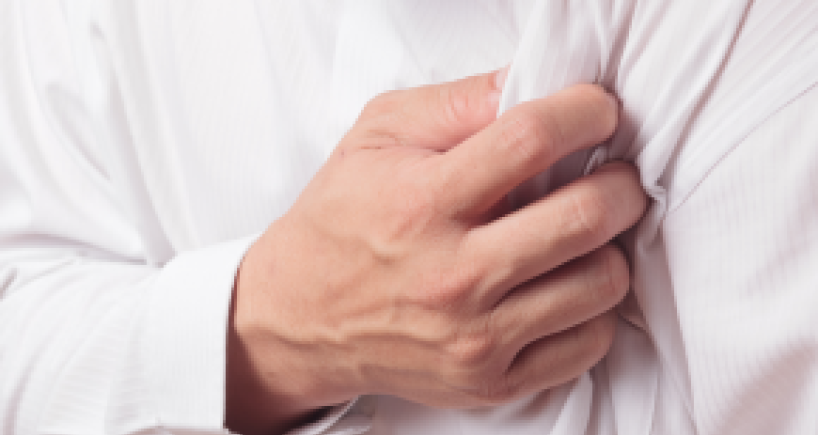
Cardiac Sciences
What To Do In Case of A Heart Attack?
What To Do In Case of A Heart Attack? Jan 14, 2014
 Heart attack is the most catastrophic presentation of a heart disease. If not treated effectively, it has a mortality of up to 25 per cent. A heart attack happens when blood supply to this vital organ gets blocked. It can be a silent disease and become a cause of sudden death with increasing age, in both men and women. The commonest cause is a sudden and complete blockage of a patient’s coronary artery by a freshly formed blood clot. The area of the heart supplied by this artery gets affected immediately and if blood supply fails to resume, the artery gets completely damaged (necrosed). The outcome of such a patient depends upon the size of the attack. In case, more than 50 per cent muscle is affected the mortality can be up to 80 percent, if not treated promptly. If a patient gets help during first hour then chances of recovery increase. Many people hesitate to help heart patients due to lack of knowledge and right information. It is very important to know the symptoms that may indicate a heart attack and the emergency first-aid treatment.
SYMPTOMS OF HEART ATTACK:
Chest pain with shortness of breath: Uncomfortable pressure, fullness, squeezing or pain in the centre of the chest, lasting for more than a few minutes.
Shoulder/arm pain: Pain spreading to the shoulders, neck or arms. The pain may be mild to intense. It may feel like pressure, tightness, burning or a heavy weight.
Other symptoms: Anxiety, nervousness, cold/ sweaty skin, increased or irregular heart rate. Profuse sweating is a common accompaniment. The patient may suddenly become breathless and gasp for breath in a massive heart attack leading to heart failure. In some situations patient may lose consciousness and experience what appears like a convulsion. This is related to either a very fast and chaotic heart beat or stoppage of the heart beat called, a cardiac arrest.
SYMPTOMS MIMICKING A HEART ATTACK THAT ARE OFTEN IGNORED
Severe upper abdominal discomfort with feeling of fainting or throwing up.Pain in the jaw and teeth without any local dental problem and often accompanied by sweating and difficulty in breathing. The diagnostic test is an Electrocardiogram which must be done as soon as possible and is a must before specific treatment can be started. There are situations, though not very common, in a full fledged attack in which ECG may not be diagnostic. Certain blood tests are diagnostic in these situations like troponin and MB CPK estimation. Nuclear scintigrams are also useful in such situations. There are instances where the diagnosis of a heart attack is made by chance when an ECG is taken for clearance before undergoing surgery for an unrelated illness or for insurance purposes. These silent heart attacks are seen commonly in diabetics where the symptom of pain at the time of a heart attack is masked.
FIRST-AID IN CASE OF A HEART ATTACK
Time is the most important factor to save the heart muscle from getting permanently damaged.The first hour after heart attack is also called the ‘golden hour’ because effective treatment instituted within one hour to open the blocked artery can lead to complete reversal of the damage suffered. Delay in starting the treatment leads to irreversible damage to the heart. In most cases, treatment started after 12 hours is of very little use. The best place to manage a patient with a heart attack is a hospital with facility of ECG monitoring and providing critical care. Coronary Care Units (CCU) are specialized areas where equipment and medical personnel manage these patients effectively. This reduces the mortality of a heart attack from approximately 20 to 35 per cent. This is achieved by restoring the blood flow in the blocked coronary artery either by using drugs (clot busters) or by doing an emergency angioplasty or stenting.
GENERAL MEASURES BEFORE PATIENT IS SHIFTED TO A HOSPITAL
1. Make the person sit down. Loosen any tight clothing.
2. Immediately shift her/him to the nearest hospital or ambulance service. Do not leave the
person alone.
3. Nothing should be given except for sublingual tablets or any other medication prescribed
by the doctor. A tablet of aspirin helps to limit the damage.300 mgs of aspirin chewed at the time of heart attack can reduce the mortality by 15 to 20 per cent.
4. Monitor the patient’s breathing and pulse until the ambulance arrives or the patient
reaches the emergency department of a hospital.
Heart attack is the most catastrophic presentation of a heart disease. If not treated effectively, it has a mortality of up to 25 per cent. A heart attack happens when blood supply to this vital organ gets blocked. It can be a silent disease and become a cause of sudden death with increasing age, in both men and women. The commonest cause is a sudden and complete blockage of a patient’s coronary artery by a freshly formed blood clot. The area of the heart supplied by this artery gets affected immediately and if blood supply fails to resume, the artery gets completely damaged (necrosed). The outcome of such a patient depends upon the size of the attack. In case, more than 50 per cent muscle is affected the mortality can be up to 80 percent, if not treated promptly. If a patient gets help during first hour then chances of recovery increase. Many people hesitate to help heart patients due to lack of knowledge and right information. It is very important to know the symptoms that may indicate a heart attack and the emergency first-aid treatment.
SYMPTOMS OF HEART ATTACK:
Chest pain with shortness of breath: Uncomfortable pressure, fullness, squeezing or pain in the centre of the chest, lasting for more than a few minutes.
Shoulder/arm pain: Pain spreading to the shoulders, neck or arms. The pain may be mild to intense. It may feel like pressure, tightness, burning or a heavy weight.
Other symptoms: Anxiety, nervousness, cold/ sweaty skin, increased or irregular heart rate. Profuse sweating is a common accompaniment. The patient may suddenly become breathless and gasp for breath in a massive heart attack leading to heart failure. In some situations patient may lose consciousness and experience what appears like a convulsion. This is related to either a very fast and chaotic heart beat or stoppage of the heart beat called, a cardiac arrest.
SYMPTOMS MIMICKING A HEART ATTACK THAT ARE OFTEN IGNORED
Severe upper abdominal discomfort with feeling of fainting or throwing up.Pain in the jaw and teeth without any local dental problem and often accompanied by sweating and difficulty in breathing. The diagnostic test is an Electrocardiogram which must be done as soon as possible and is a must before specific treatment can be started. There are situations, though not very common, in a full fledged attack in which ECG may not be diagnostic. Certain blood tests are diagnostic in these situations like troponin and MB CPK estimation. Nuclear scintigrams are also useful in such situations. There are instances where the diagnosis of a heart attack is made by chance when an ECG is taken for clearance before undergoing surgery for an unrelated illness or for insurance purposes. These silent heart attacks are seen commonly in diabetics where the symptom of pain at the time of a heart attack is masked.
FIRST-AID IN CASE OF A HEART ATTACK
Time is the most important factor to save the heart muscle from getting permanently damaged.The first hour after heart attack is also called the ‘golden hour’ because effective treatment instituted within one hour to open the blocked artery can lead to complete reversal of the damage suffered. Delay in starting the treatment leads to irreversible damage to the heart. In most cases, treatment started after 12 hours is of very little use. The best place to manage a patient with a heart attack is a hospital with facility of ECG monitoring and providing critical care. Coronary Care Units (CCU) are specialized areas where equipment and medical personnel manage these patients effectively. This reduces the mortality of a heart attack from approximately 20 to 35 per cent. This is achieved by restoring the blood flow in the blocked coronary artery either by using drugs (clot busters) or by doing an emergency angioplasty or stenting.
GENERAL MEASURES BEFORE PATIENT IS SHIFTED TO A HOSPITAL
1. Make the person sit down. Loosen any tight clothing.
2. Immediately shift her/him to the nearest hospital or ambulance service. Do not leave the
person alone.
3. Nothing should be given except for sublingual tablets or any other medication prescribed
by the doctor. A tablet of aspirin helps to limit the damage.300 mgs of aspirin chewed at the time of heart attack can reduce the mortality by 15 to 20 per cent.
4. Monitor the patient’s breathing and pulse until the ambulance arrives or the patient
reaches the emergency department of a hospital. 


















